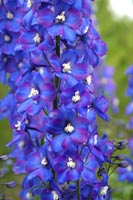This news item expired on Sunday, May 31, 2015 so the information below could be outdated or incorrect.
Don't miss the link to BCTV's May Garden Chores video at the bottom of the page.
Lawns:
-
Mow frequently enough to remove no more than 1/3 of the grass blade at a time.
-
Mow cool season grasses 2 1/2 to 3 inches high.
-
Do not fertilize fescue and bluegrass lawns.
-
Zoysiagrass lawns can be fertilized with 1/2 pound of nitrogen per 1,000 square feet 3 weeks after the grass has greened-up.
 Ornamentals:
Ornamentals:
-
If you would like to rearrange some of your daffodils, the bulbs can be moved now. Dig deep so you don’t
damage the bulb. Keep the leaves and roots intact and replant at the original depth.
-
Do not remove leaves from bulbs until they have turned brown.
-
Organic mulch is the best tool for maintaining soil moisture and reducing weeds in the landscape. Mulch should be 2 to 3 inches deep, including the old layer. More than that is not only a waste of money, it can be detrimental to plant growth.
-
Prune spring blooming shrubs soon after blossoms fade.
-
If you move house plants outdoors for the summer, wait until nighttime temperatures are above 50 degrees. Do not place plants in direct sunlight.
Fruits:
-
Keep weeds out of the strawberry bed and put straw mulch around plants.
-
For fruit trees, thin apples, pears and peaches to about 6 inches apart when the fruit is the size of a nickel.
-
Begin fungicide sprays, especially on peaches, plums and grapes.
Vegetables:
-
Plan your vegetable garden on paper. Keep the plan from year to year so you can plan crop rotations.
-
Check cabbage family crops for cabbage worms.
-
Thin seedlings of radishes, carrots, lettuce and other early plantings when they have 2 true leaves. Carrots and radishes should be thinned to 1 to 2 inches apart, lettuce and other greens to 6 inches.
-
Soil temperature should be warmed up to at least 65 degrees before planting beans, melons and okra - after May 5.
Other:
-
Honeybees may swarm in the spring. Swarms are not aggressive and not a cause for alarm. If you have a swarm of honeybees that takes up residence in an unwanted location, contact the Extension office for the names of beekeepers who may come and collect them.
For more information, view BCTV's May Garden Chores video, or call Buncombe County Cooperative Extension at 255-5522.